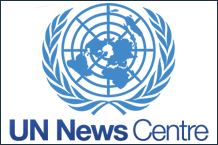Originally published by UN News Centre, 30 June 2017.
As an international conference on science and technology wrapped up in Vienna, the head of a United Nations partner organization that works to end nuclear testing stressed that women have a "powerful voice" in the global scientific community.
“We cannot build a world that is just, a world that is fair, a world that is peaceful, without the contribution of women,” stated Lassina Zerbo, the Executive Secretary of the Comprehensive Nuclear-Test-Ban Treaty Organization (CTBTO).
[caption id="attachment_15952" align="alignnone" width="960"] Participants during the CTBT Science and Technology 2017 Conference. Photo: CTBTO[/caption]
In an interview with UN News during the CTBT: Science and Technology 2017 Conference, Mr. Zerbo said: “If women are at the heart of solving problems domestically in their respective families, and socially, why don’t we use them on big issues that require heart, feeling and vision, which they have already?”
The Conference, the sixth of its kind, focused on nuclear test monitoring technologies and their various applications. In addition to the participation of women scientists, Mr. Zerbo also noted the “youth strand” that had been integrated throughout the programme.
The CTBTO Youth Group was launched last year with only nine members. Today there are around 200, about 70 of whom attended the conference, held at the Hofburg Palace.
“I've watched them take advantage of the opportunity we offer them to be acquainted on issues of non-proliferation and disarmament, as well as the threat of nuclear weapons. They have decided they do not want their generation and future ones to have to deal with this,” said the Executive Secretary.
The biggest contribution of young people, he added, was to spread the message about the importance of the CTBT on social media networks and their blogs.
The Comprehensive Nuclear-Test-Ban Treaty, adopted by the General Assembly in September 1996, has not yet entered into force. For this to happen, ratification is required from the so-called Annex II countries. Of these, China, the Democratic People’s Republic of Korea (DPRK), Egypt, India, Iran, Israel, Pakistan, and the US have yet to ratify.
Mr. Zerbo noted that using the right words to get to the heart of those who know that nuclear test monitoring is important to ban nuclear test explosions, once and for all.
“The ban on nuclear testing is a low-hanging fruit in our fight towards banning nuclear weapons.”
